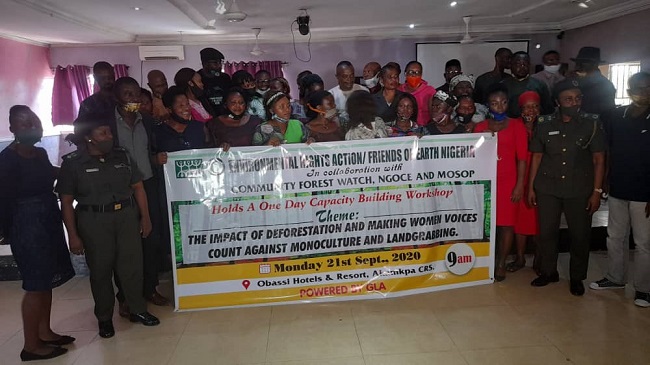As the world celebrated the No Monoculture Day on Monday, September 21, 2020, the Environmental Rights Action/Friends of the Earth Nigeria (ERA/FoEN) has said that it stands in solidarity with social movements, networks and communities to resist incresing monocultures expansion Nigeria.

The International Day Against Monoculture Tree Plantations is marked on September 21 of every year to draw attention to the impacts of monoculture plantations on the environment, conservation and livelihood concerns of rural communities.
In his opening remarks during an event to observe the No Monoculture Day held in Obassi Resort, Akampa, Calabar, Cross River State on Monday, September 21, Dr Godwin Uyi Ojo, Executive Director, ERA/FoEN, submitted that monoculture tree plantation is bad because of the high level chemical inputs such as herbicides and pesticides which put the world food system at great risk.
According to him, monoculture tree plantation also displaces small scale local farmers growing local staples such as yam, cassava and plantain, “some of which are now outgrowers of oil palm for the big companies such as Wilmar PZ and Okomu Oil Palm Company”.
Ojo, who was represented at the forum by Dr Maurice Olory, the volunteer coordinator of Community Forest Watch, said: “No matter what, trees of similar specie cannot make a forest. Therefore, the rich biodiversity associated with natural forests is lost in the case of monocultures such as oil palm plantations. The expansion is also endangering endemic biodiversity such as butterflies and bees, the Pandrillus monkeys and chimpanzees in Cross River State and the slaters guenon and elephants in Okomu Forest Reserve in Edo State have come under severe threat due to oil palm plantations.
“We raise our voices of resistance against the increasing illegal logging of trees and the appropriation of community lands by government to make way for monoculture agrocommodities that serve the interest of big agribusiness multinational companies and to the detriment of the impacted communities. Governments and businesses should put people first before profits. Displaced communities who are mostly farmers have nowhere to turn than become farm labourers to the multinational agribusiness for meagre wages.
“The increasing expansion for monocrops especially oil palm plantation is colonising our forests and farmlands and eroding community sovereignty. Economic activities and demographic pressure put pressure on the scare land. It is the communities especially women that bear the brunt of deforestation from loss of timber and non-timber forest products that they depend on.
“In most cases such as Edo and Cross River states, land is appropriated for oil palm expansion and communities free, prior and informed consent is not sought hence their voices count for nothing in the land governance process.
“We say no to the rising monocultures because the environment is our Life. It is not for sale.”
Speaking, a Director from the state Forestry Commission, Dr Ekpeyong Ita, said the issue of monoculture has been a major threat of biodiversity in the state.
Ita stressed that if monoculture is allowed to go on, it would destroy the biodiversity and make the state lose its virgin forests.
He called for a concerted effort from all individuals and stakeholders in protecting the forests.
The Controller of National Park in Cross River, Mrs Caroline Olory, said that the state has the largest of the remaining rainforest in Nigeria.
Olory, who maintained that forest preservation should be collective, called for the sustainability in the fight against deforestation in the state.
